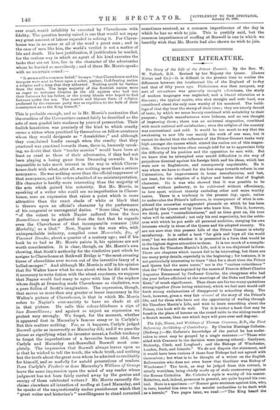CURRENT LITERATURE.
The Story of the Life of the Prince Consort. By the Rev. W. W. Tulloch, B.D. Revised by her Majesty the Queen. (James Nisbet and Co.)—It is difficult in the present time to realise the difference between the intellectual life of the England of toAay and that of fifty years ago. Philistinism was then rampant, any sort of art-culture was generally thought Effeminate, the Study of modern languages was neglected, and a liberal education at a discount; the typical squire, who shot straight and rode bard, was considered about the only man worthy of his manhood. The build- ings of that day boar the stamp of their time ; they are utterly devoid of taste, by which we mean beauty combined with suitability to their purpose; English manufactures were hideous, and no one thought of improving them ; there was an universal stagnation, combined with much national self-satisfaction ; even the religion of the country was conventional and cold. It would be too much to say that the awakening to new life was mainly the work of one man, but it cannot be denied that the influence of the Prince Consort ranks very high amongst the causes which stirred the nation out of this stagna- tion. His story has been often enough told for us to appreciate fully the difficulty of his position and the opposition he met with. But we know that he triumphed over untold difficulties in the way of prejudices directed against his foreign birth and his ideas, which last were new to Englishmen, and consequently unpalatable. He it was whom we have to thank for the first steps towards reform in our Universities, for improvement in home manufactures, and last, not least, for the adoption of a higher and better ideal of English character. He it was who showed that it was possible to be learned without pedantry, to be cultivated without effeminacy, to love sport without thereby excluding other and more worthy tastes. There is a tendency in the present day, again, rather to undervalue the Prince's influence, in consequence of what is con- sidered the somewhat exaggerated pinnacle on which he has been placed by the Queen and by those who knew him. This is, however, wo think, pare "contradictoriness," and as time goes on, his true value will be established ; not only his real superiority, but the noble- ness with which he put aside all personal ambition, merging his own interests wholly in those of the Queen and his adopted country. We are not sure that this present Life of the Prince Consort is wholly satisfactory. It is called a book "for girls and boys all the world over," but we doubt whether it is presented in a form that would be in the highest degree attractive to them. It is too much of a compila- tion from Sir Theodore Martin's Life, and it is too disjointed in form. There are chapters which cannot fail to be interesting, but there are too many petty details, especially in the beginning ; for instance, it is not particularly interesting to learn "that for a short time the Prince and Queen had the same name," nor is the "curious coincidence" that the "Prince was baptised by the names of Francis Albert Charles Augustus Emmanuel by Professor Ganzler, the clergyman who bed the year before officiated at the marriage of the Duke and Duchess of Kent," of much significance. Then there are far too many quotations strung together (from loving relatives), which we feel sure would call forth strong exclamations of disapproval in schoolboy slang. The book, however, gives a very fair résumé of the story of the Prince's life, and for those who have not the opportunity of wading through Sir Theodore Martin's Life, and wish to learn something about the Prince, this book will do well. Yet it is rather a book that may be found in the place of honour on the round table in the sitting-room of a Scotch manse, than one which boys will pore over and dog-ear.


















































 Previous page
Previous page